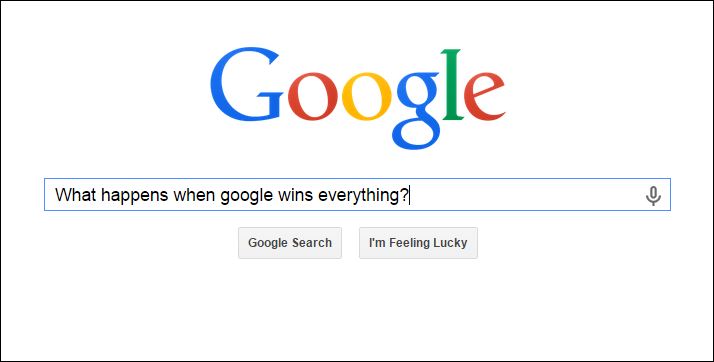
I’ve been exploring ideas for creative new content forms and I’ve come to a realization. Google is holding us back.
Think about how much of what we create, and how we create it, is influenced by Google’s rules (or what we know of them). Conforming to SEO best practices forces us into a very small creative box, and the more we we get creative and stray from that box, the less likely we will show up in Google’s search results. There is a constant trade-off between form and practical search considerations.
When is it time to just ignore Google and go for it?
Here are some thoughts on when we can — and should — ignore Google.
1. When you’re epic.
One of my favorite recent {grow} posts was a display of 10 soul-grabbing brands that are creating content so wonderful they simply don’t need SEO.
In fact, I recently demonstrated that adhering to the rules of SEO can actually prevent you from going viral. Even in my own little world I can see that my least-optimized posts often do the best because by definition, they are something entirely original.
A favorite example is the Funny or Die site. It is so creative and endlessly entertaining. With videos titles like Tiny Detectives and The Landlord (one of the funniest videos ever) this site isn’t ever going to need a keyword strategy!
If you’re creating content so consistently compelling that you have become part of the conversation, you really can work outside the boundaries of Google, right?
2. When you’re huge
You know who can ignore Google? Apple. Apple can ignore the Big G all day long. They’re the most valuable brand on earth. If you want an iPhone, you’re getting an iPhone and there is not going to be a search engine in the way.
But I’m a little guy. I still get a ton of organic traffic to my website. I have to play by Google’s rules until I am as big as Apple. I am projecting this to occur sometime in 2016. More or less.
3. When there are better search engines for your product
You know what is awesome? Etsy. You can find some pretty cool crafts there. If you’re in the business of selling hand-crafted leather keychains or carved stone garden ornaments, it makes sense to optimize your Etsy, right? I wouldn’t even think of using Google. When I want to find a nearby restaurant in a new city I usually turn to Yelp. When I am looking for a particular book as a present I go to Amazon. And so on.
And by the way, Amazon is quietly rolling out a service where you can find local service providers like plumbers and landscapers. Apparently Amazon takes a small cut as a referral fee. Keep your eye on that new seach engine.
4. When you have paid subscribers
Have you seen some of the amazing creative treatments in online magazine versions? My favorite is Esquire. In the last edition, the cover of the online edition was a stylish movie … and that’s not uncommon. The editors make their magazine come to life in so many amazing ways and Google be damned. Why? They don’t need search. All they need is paid subscribers. Keep it cool, keep it exclusive, and keep it away from Google!
5. When it doesn’t matter any more.
I have seen the future and it is ZIte-like. Zite is the best utility I have seen so far to actually “learn” what content I enjoy. It customizes an evolving delivery system based on what it is learning about me. The more I use it, the better it gets.
Five years ago when you or I did a search on Google for the best deal on an automobile or a review of a new car model, we would get similar results … probably the same results. But over time, Google has made its search results highly-tailored to your environment. Where are you? Who are you? Who are your friends? This has resulted in an ever-tightening bubble of personalized results. The results you would get today are almost certainly different from what I would get.
Zite is an even more extreme example of this as it actually pushes content to you and only you, constricting the scope of possible content that you see. Will that require different strategies? Perhaps we won’t just be concerned with SEO. We might also need to consider Zite Engine Optimization? : )
So that was a little weird and rambling. My point is that how we get our information is probably fragmenting. This will present both challenges and opportunities as we struggle to conform to Google-topian rules of conduct or use new content forms to break free and stand out!
What do you think?


